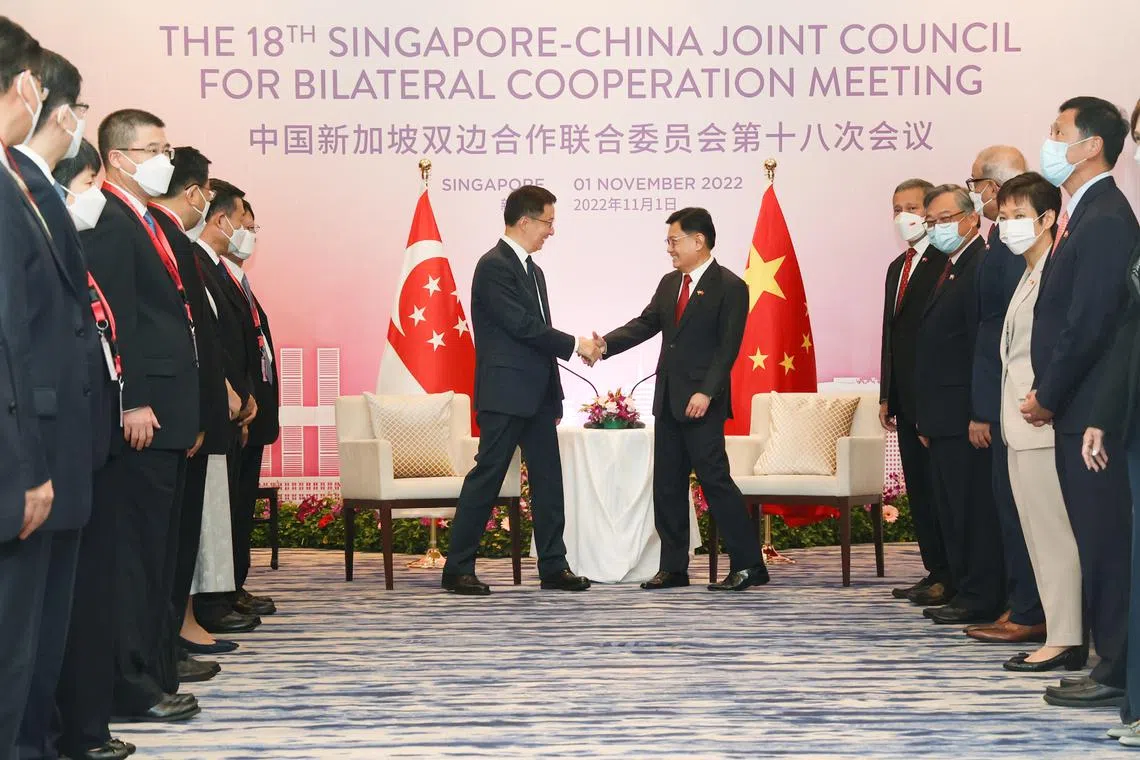Singapore and China reach 19 deals, boosting ties in green financing, digitalisation
Sign up now: Get ST's newsletters delivered to your inbox

Chinese Vice-Premier Han Zheng (left) and Deputy Prime Minister Heng Swee Keat meeting at the Four Seasons Hotel on Tuesday.
PHOTO: LIANHE ZAOBAO
SINGAPORE - Singapore and China reached 19 agreements – the most in recent years – after an annual top-level meeting here on Tuesday, deepening cooperation in areas from green financing to digitalisation to innovation.
The Joint Council for Bilateral Cooperation (JCBC) returned to an in-person format at the Four Seasons Hotel for its 18th edition, with 14 Singapore representatives and 14 Chinese counterparts attending, after two years of teleconferencing.
Deputy Prime Minister Heng Swee Keat, who co-chaired the apex meeting with Chinese Vice-Premier Han Zheng, said the “bumper crop” of 19 deliverables – along green, digital and connectivity themes – reflected the growing depth and breadth of bilateral cooperation.
“Vice-Premier Han’s visit demonstrates the continued importance and relevance of JCBC as our apex platform for bilateral cooperation. It is an important milestone as we progressively step up our people-to-people exchanges,” Mr Heng told the Singapore media after the meeting.
Singapore will continue to work with China to gradually and safely restore weekly flights between the two countries to pre-Covid-19 levels, he said, adding that both sides had a good discussion about this.
The 19 deals included those in emerging areas of the green and digital economies, as well as renewals of existing collaboration.
For instance, the Monetary Authority of Singapore and the People’s Bank of China will set up a green finance task force to explore green investment opportunities in China and other countries.
The Singapore Customs and the Chinese General Administration of Customs will launch a new tracking service for container movement between the Port of Singapore and two Chinese ports, using blockchain technology, by the end of 2022.
The Ministry of Trade and Industry also reached an innovation cooperation agreement with the Chinese Ministry of Science and Technology to support joint research projects and grow policy exchanges.
Progress made on three flagship government-to-government projects – Suzhou Industrial Park, Tianjin Eco-city
Another agreement aims to further promote Singapore business activity in Guangzhou Knowledge City, a state-level bilateral cooperation project launched in 2010.
First held in 2004, the JCBC is the highest-level forum for deepening ties between the two countries. Singapore ministers in attendance on Tuesday included Foreign Minister Vivian Balakrishnan, Trade and Industry Minister Gan Kim Yong and Transport Minister S. Iswaran.
In his opening remarks at the meeting, Mr Heng congratulated the Communist Party for the successful conclusion of the 20th Party Congress in October
“A successful China that is well integrated into the international system benefits China and the world,” he added.
In his opening remarks in Mandarin, Mr Han said that despite the health, security and economic challenges over the past year, Singapore and China have maintained good relations.
“We hope that this meeting can drive cooperation between both countries to achieve new developments,” he said, adding that progress on the three government-to-government projects has also been accelerated.
Mr Han, who is on a two-day trip to Singapore, is the most senior Chinese leader to visit since the pandemic. This is also his first overseas trip since Covid-19 started. The Chinese delegation included Mr Ding Xuedong, executive vice-secretary of the State Council, and Mr Ni Hong from the Ministry of Housing and Urban-Rural Development.
On future milestones, Mr Heng noted that 2023 will mark the 15th anniversary of the Tianjin Eco-City project
“So it’s timely to refresh how we pioneer low-carbon development and scale solutions to more cities in China and the world,” he told reporters.
He added that Suzhou Industrial Park,



